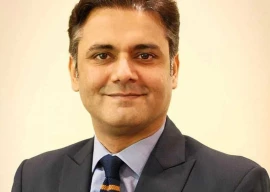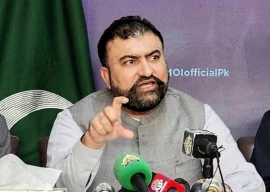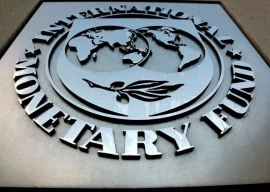
He issued these directives while presiding over a joint meeting of the health department, KWSB and the Karachi Metropolitan Corporation (KMC) to chalk out a strategy to combat the menace of dengue and naegleria. The meeting was attended by health minister Jam Mehtab Dahar, principal secretary to CM, Alamuddin Bullo, KMC administrator and Karachi commissioner Shoaib Siddiqui, health secretary Saeed Mangnijo, local government secretary Imran Atta Soomro and KWSB managing director Hashim Raza Zaidi.
The chief minister said he had reports that water samples collected from different areas of the city had no traces of chlorination. "This is unbelievable and needs to be checked thoroughly," he said.
Dahar said that he had inspected the entire water supply system from Dhabeji to the main conduit. "This is a fact that KWSB mixes chlorine in water a little higher than the prescribed dose but the long water supply pipelines are very old and have leaked from different spots," he said and added "The chlorine evaporates when chlorinated water is exposed to oxygen. This is why the chlorinated water samples collected from different areas showed negative results," he said.
Karachi Commissioner Shoaib Siddiqui recalled that in the year 2013, drastic measures were taken to control the spread of the dengue virus in the city. "The government had conducted special training sessions for doctors and paramedical staff to deal with dengue patients," he said. Nets were made available in the hospitals and isolated wards were designated. "An awareness campaign was launched by involving the civil society and various civic agencies. As a result, the situation was brought under control," he said, adding that it was the health department that framed the dengue control and prevention rules and appointed inspectors to check vulnerable sites and areas.
Zaidi endorsed the views of the health minister and told the meeting that he had developed 18 chlorination booster spots so that chlorination losses caused by evaporation could be controlled. "A bottle of sodium hypo chloride, which costs around Rs17, is enough to chlorinate water in a house for a month," he said, adding that the KWSB spends Rs130 million on the purchase of chlorine every month.
The chief minister told him that he had zero tolerance as far as chlorination of water was concerned. "I would advise you to assign the chlorination work to honest and dedicated officers. I will not compromise on this issue. Health is wealth and this city has already suffered a lot," he said categorically.
The chief minister directed the KWSB and KMC to start fumigation, launch an awareness campaign against dengue and Naegleria and also directed the water board to expand their operations in the areas that were out of their official limits. "If you need funds, I will provide them to you but it must be done," he stressed.
Published in The Express Tribune, July 10th, 2015.



























1714370039-0/ojwilson-(1)1714370039-0-270x192.webp)


-(1)1714378140-0/AliAminMaryam-(4)-(1)1714378140-0-270x192.webp)
-(1)1714458896-0/ASP-(2)-(1)1714458896-0-270x192.webp)






COMMENTS
Comments are moderated and generally will be posted if they are on-topic and not abusive.
For more information, please see our Comments FAQ